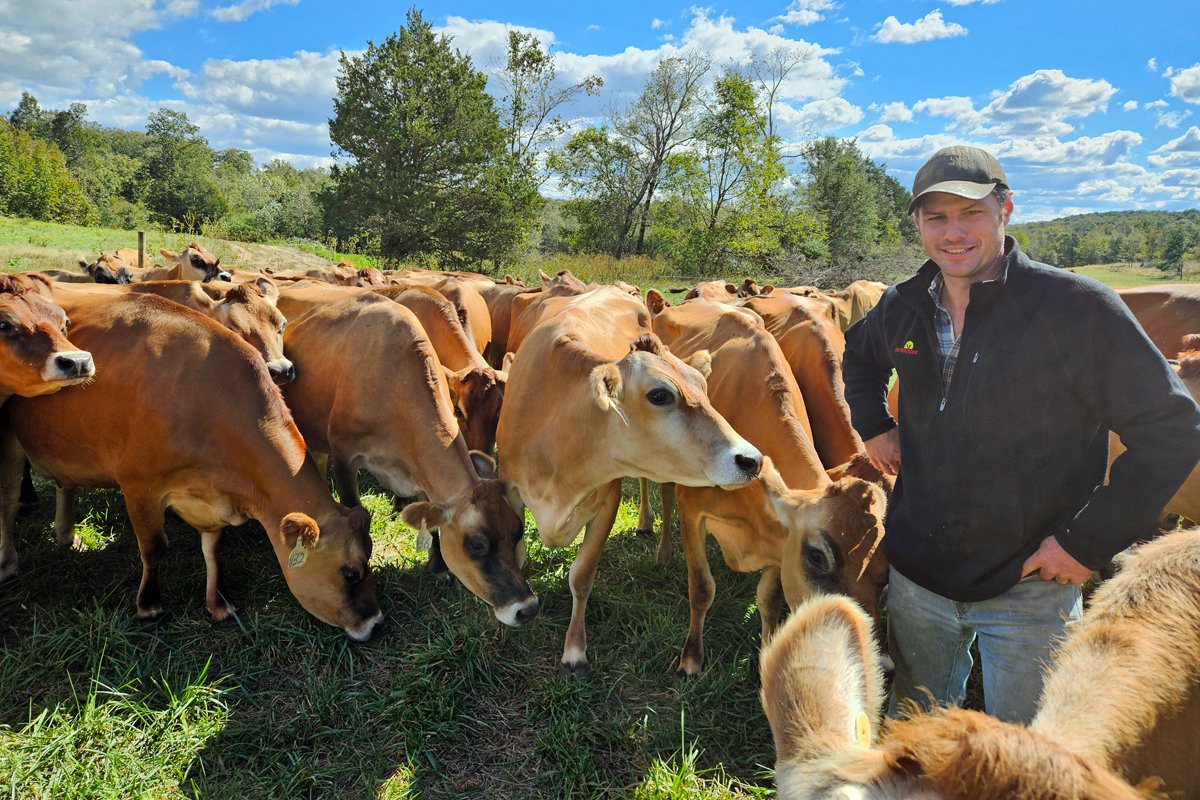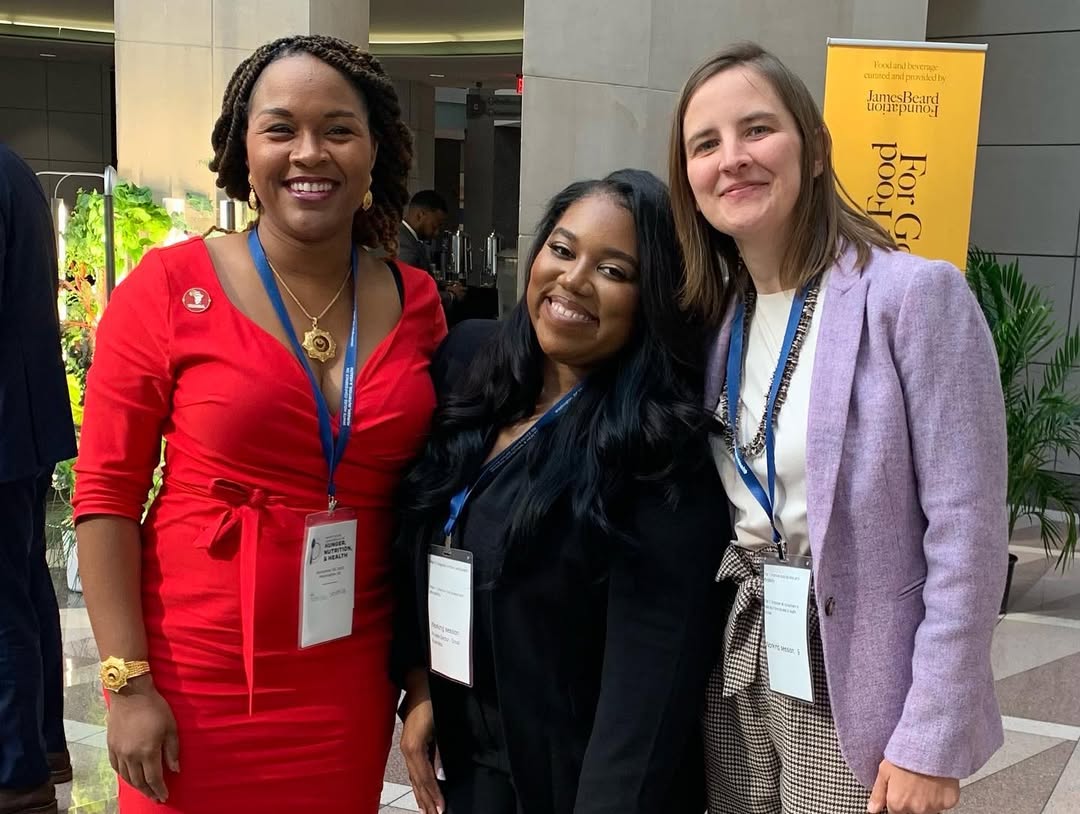Western North Carolina farms, restaurants, and even a festival quickly switched gears to get fresh food and water to neighbors devastated by the worst storm in more than a century.

Western North Carolina farms, restaurants, and even a festival quickly switched gears to get fresh food and water to neighbors devastated by the worst storm in more than a century.
October 29, 2024

Preston Green of Big Bottom Milk Company and his herd of Jersey cows outside Forest City, North Carolina. Less than three weeks before, the pasture had been swamped by Hurricane Helene. (Photo credit: Daniel Walton)
A few days after Helene hit Western North Carolina, Stuart Beam and Preston Green of Big Bottom Milk Company took stock of their situation. Their creamery’s infrastructure—including its 70-year-old bottle filler—was intact. They had generator power, clean municipal water, and an ample supply of plastic milk packaging, including gallon jugs.
Expand your understanding of food systems as a Civil Eats member. Enjoy unlimited access to our groundbreaking reporting, engage with experts, and connect with a community of changemakers.
Already a member?
Login
But as the company’s co-founders made calls to farming contacts beyond their home of Forest City, about 60 miles southeast of Asheville, Beam and Green learned that potable water was much harder to come by elsewhere in the region, especially in rural areas with challenging logistics. So, they sprang into action, bottling and shipping water directly to places in need, all while keeping up their usual milk production.
“We’ve kind of been helping everybody else so we didn’t have to think about our problems. It’s a lot more fun.”
Food and agriculture businesses across Western North Carolina are telling similar stories amid the aftermath of Hurricane Helene. Although Helene had weakened into a tropical storm by the time it reached the area, it was still the region’s worst storm since 1916.
Helene killed at least 98 residents in Western North Carolina, knocked out power and water for hundreds of thousands of people, and destroyed countless buildings. Many farmers, occupying low-lying valleys and riversides in the Appalachian Mountains, were especially vulnerable to record levels of flooding.
And yet those same farmers, as well as people farther up the supply chain in the Asheville area’s vaunted food scene, have been working to support their communities, even as they deal with the fallout themselves. By repurposing equipment, opening space to relief efforts, and organizing donations, they’re helping meet the region’s most important needs. Tested by the storm, the tight-knit community has responded with food, water, and hope that Western North Carolina will pull through together.
Green and Beam had expected a normal, albeit rainy, day on the farm when they went to bed the night of September 26. When the two got up the next morning, it became clear the day would be anything but.
Green had to walk each of Big Bottom’s 65 Jersey cows from their pasture to the milking parlor across a road flooded with eight inches of water. Beam’s truck got stuck on his way from the dairy to the creamery; after Green rescued him, he tried again in a tractor, taking over 2 hours to navigate roughly 2 miles amid lashing rain and storm-toppled trees. Once Beam started the facility’s generator, he set out again, struggling for hours to clear side roads in rural Rutherford County.
“There was several times where I was scared of my life,” Beam recalls. “I was shoving trees, trying to hook to somebody’s car and get them out of the ditch to where they could get out of there. And you’re just thinking, ‘The next tree’s going to fall on me.’”
Once the storm had subsided and the worst of the wreckage had been cleared, the two launched into their water bottling effort. Word of mouth and social media posts brought a steady stream of helpers, from children assembling cardboard boxes to an 81-year-old man with a walker feeding the machinery with empty jugs. On the first night of the operation, creamery staff and volunteers stayed up until 3 a.m., packing 40 pallets of water, with each pallet holding 100 to 140 gallons depending on bottle size.
“We’ve kind of been helping everybody else so we didn’t have to think about our problems,” Beam says with a modest smile. He and Green both lost power at their homes for several days, and he had to clear a tree that had fallen on his own house. “It’s a lot more fun.”
The effort grew as Big Bottom’s web of connections sprang into action. Sofia Lilly, a friend at nearby Overmountain Vineyards, spearheaded nearly $50,000 of fundraising to keep the creamery humming. Green tapped his contacts in the packaging world, temporarily buying his suppliers out of gallon and half-gallon jugs. Beam, who co-chairs a Farm Bureau committee for young farmers and ranchers in the region, talked with colleagues across the state to identify the most critical needs and supplement water deliveries with other essentials.
Among those beneficiaries was the Buladean Volunteer Fire Department, roughly 100 miles northwest in Mitchell County. Fire Captain Jeremiah Swann and his crew had spent days cutting fallen trees, clearing the route to the nearby Tennessee border before unblocking residents’ driveways and conducting wellness checks. They were running low on supplies when a truck from Big Bottom showed up, bearing three pallets of water, over 300 gallons of fuel, and a healthy amount of milk.
“It blesses all of us up here to know that people are rallying around, willing to help us and bring us stuff to get us through a hard time like this,” Swann says. “I would travel 2.5 hours to go get their milk—one, because it’s some of the best milk I’ve ever drank, and two, they’re willing to chip in and help us up here.”
Chef Jamie McDonald had long extended an invitation for Jason Collis to come by Bear’s Smokehouse BBQ the next time he was in Asheville. The two had worked together in Morocco and Poland for World Central Kitchen (WCK), a global nonprofit that provides free hot meals in crisis situations.
“We thought it was going to be more on a vacation basis,” quips Collis, WCK’s chief relief officer.
Instead, McDonald and Bear’s co-owner Cheryl Antoncic partnered with Collis’s team to transform their restaurant into the command center of WCK’s Helene response. Bear’s is closed to the public, but on a sunny Monday morning, its courtyard buzzes with food deliveries, a meal-packing assembly line, and several giant stainless-steel skillets stir-frying vegetables and chicken.
The Bear’s interior is a logistical war room, complete with a massive map outlining deliveries of roughly 30,000 meals per day to more than 160 distribution points. Collis says needs are constantly shifting, but he expects WCK to remain in the region until widespread potable water returns, which could be many weeks away.
The majority of the meals are cooked on site, but many have come from other Asheville restaurants that have shifted operations toward relief, such as Chai Pani, Curate, and Rocky’s Hot Chicken Shack. (WCK pays local restaurants per meal, allowing them to retain staff and be better prepared to serve the public when conditions allow.)
Antoncic is proud of her restaurant’s flexibility and use of local connections in the face of the unexpected. She points to how its freezer capacity saved 1,000 pounds of meat from storm-damaged purveyor Hickory Nut Gap Farms that was distributed through WCK meals.
Just as importantly, Antoncic continues, Bear’s has catalyzed relationships beyond the meals themselves. Through Linked4Life, a mental health nonprofit supported by the restaurant, she’s helped local counselors reach impacted communities at food distribution sites. And she recently held an event where people wrote messages of hope, attached to carabiners symbolizing connection, that will be sent out into the community in the days to come.
“As much as food and water are basic human needs, I really do believe that connection is a basic human need as well,” Antoncic says. “If you do have a crisis, whether it’s in your own personal life or in a community at large, having those support networks is what’s going to get you through it.”
In 2017, Meg Chamberlain started the WNC Fermenting Festival in Marshall, about 20 miles northwest of Asheville, as a celebration of the region’s small food processors. In the wake of Helene, however, she says the community has much less to celebrate.
Some regular festival vendors lost everything in the storm. The building that housed Asheville Tea Company floated down the Swannanoa River in a video featured on Fox News. Others, including Chamberlain’s own fermented food company, Fermenti, which sells kimchi and sauerkrauts, have been unable to reopen or manufacture products due to the area’s ongoing water problems. All face greatly reduced sales during the normally thriving fall tourist season.
In response, Chamberlain is using the November 3 festival to raise support for both small-scale food businesses and Western North Carolina residents in need. The in-person event is still happening, with its footprint slightly adjusted due to water damage at its location; only one of roughly 40 planned vendors dropped out, even though some have little to sell.
“It’s important right now to anchor a sense of normalcy in the community, because we have been lacking that,” she says. “For our mental health moving forward, it’s going to be important to help create those connections before we’re shuttered away in the winter.”
The festival is also now tied to an online fundraising campaign, which will go toward purchasing products from the festival’s roughly 40 vendors and donating them directly to local food banks. Chamberlain flags Beacon of Hope Services, a food bank in Marshall, as one recipient, noting that this community was hit particularly hard.
Chamberlain notes that while a lot of food, water, and other goods are arriving at distribution centers right now, “a lot of it’s not going to be here in a couple weeks. I’m not a first-wave responder, but I’m a second-wave responder, and I can be here to help do this.”
This kind of locally based effort is crucial for small food businesses, Chamberlain argues, because they’re likely to fall through the cracks of federal and state assistance. On Oct. 15, for example, the federal Small Business Administration announced that its disaster loan program had run out of money, and Republican leaders in Congress have refused to consider further aid until their regularly scheduled return to Washington November 12.
“I would challenge people to make relationships with food producers that they can connect with and look at eye to eye,” she says. “Now is the time.”

July 30, 2025
From Oklahoma to D.C., a food activist works to ensure that communities can protect their food systems and their future.
Like the story?
Join the conversation.